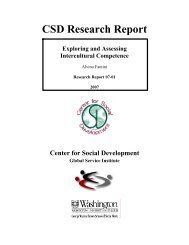Rediscovering social investment in developmental welfare state ...
Rediscovering social investment in developmental welfare state ...
Rediscovering social investment in developmental welfare state ...
Create successful ePaper yourself
Turn your PDF publications into a flip-book with our unique Google optimized e-Paper software.
R E D I S C O V E R I N G S O C I A L I N V E S T M E N T I N D E V E L O P M E N T A L W E L F A R E S T A T E P O L I C I E S :<br />
B A C K T O T H E F U T U R E<br />
identify <strong>developmental</strong>ist policies <strong>in</strong> the Western <strong>in</strong>dustrial nations, the <strong>social</strong> development approach<br />
must be augmented with <strong>in</strong>sights from <strong>welfare</strong> <strong>state</strong> research. I suggest that a two-track approach to<br />
<strong>social</strong> development, rather than a s<strong>in</strong>gular global model, be used that emphasizes the same<br />
productive logic of <strong>social</strong> policy but that recognizes the different sociopolitical contexts <strong>in</strong> which it<br />
is expressed (e.g., Dahl et al., 2001).<br />
Social development has begun to f<strong>in</strong>d currency with western <strong>welfare</strong> <strong>state</strong> researchers. This has been<br />
reflected <strong>in</strong> the <strong>in</strong>creased application of conceptual tools—devised for the study of Western <strong>welfare</strong><br />
<strong>state</strong>s—to emerg<strong>in</strong>g <strong>welfare</strong> <strong>state</strong>s (Gough & Wood, 2004; Holliday, 2000; Hort & Kuhnle, 2000;<br />
Kwon, 2005a). It also has been reflected to a lesser degree <strong>in</strong> the <strong>in</strong>creased recognition of<br />
<strong>developmental</strong>ist elements with<strong>in</strong> the <strong>in</strong>dustrialized <strong>welfare</strong> <strong>state</strong>s, especially late <strong>in</strong>dustrializers<br />
(Dahl, Lødemel, & Drøpp<strong>in</strong>g, 2001; Kangas & Palme, 2005; Kurien, 2006; Vartia<strong>in</strong>en, 2002).<br />
Exploration of <strong>developmental</strong>ist ideas has been slowed by a major divide between the study of<br />
<strong>welfare</strong> <strong>state</strong>s <strong>in</strong> developed countries and descriptive work on <strong>social</strong> policies <strong>in</strong> develop<strong>in</strong>g countries<br />
(Mkandawire, 2001, 2006b, 2009). A l<strong>in</strong>ear theory of development has contributed to a one-sided<br />
emphasis on economic growth as compared to <strong>social</strong> development <strong>in</strong> the Global South<br />
(Mkandawire, 2001, 2006a, 2006b, 2009). In the Global North, it has meant that the importance of<br />
<strong>social</strong> policy to economic development, <strong>in</strong> both the history and current context of developed<br />
nations, has not been systematically explored. The result has been neglect of the importance of<br />
<strong>social</strong> policy to economic development as an ongo<strong>in</strong>g reproductive process. 25 The tendency to see<br />
the <strong>welfare</strong> <strong>state</strong> as an end <strong>state</strong> (Therborn, 1987) has contributed to obscur<strong>in</strong>g its role <strong>in</strong><br />
development. 26<br />
The application of <strong>social</strong> development to <strong>social</strong> policy, especially as it is conceived of <strong>in</strong> the <strong>welfare</strong><br />
<strong>state</strong>, has been quite limited, largely because the model orig<strong>in</strong>ated <strong>in</strong> the Global South (Midgley,<br />
<strong>in</strong>extricability of the economic and <strong>social</strong> is a condition shared by the Global South and North, even if their <strong>social</strong><br />
policies and <strong>in</strong>stitutions differ greatly.<br />
25 Among other th<strong>in</strong>gs, the l<strong>in</strong>ear approach implies that democratic demands for equity cannot be a part of the<br />
development process (Mkandawire, 2006a). There is a tendency to equate <strong>developmental</strong> ideas with authoritarian <strong>state</strong>s.<br />
The popular notion of the <strong>developmental</strong> <strong>state</strong> implies that development occurs first, then politics arise, and the <strong>welfare</strong><br />
<strong>state</strong> emerges later. This view tends to marg<strong>in</strong>alize the role of politics and the <strong>state</strong> (and <strong>social</strong> policy <strong>in</strong> particular) <strong>in</strong><br />
foster<strong>in</strong>g development, limit<strong>in</strong>g the extent to which <strong>developmental</strong>ist ideas are applied to th<strong>in</strong>k<strong>in</strong>g about policies that are<br />
not just productive but also protective. Most <strong>developmental</strong> <strong>state</strong>s seem to be poorly developed <strong>welfare</strong> <strong>state</strong>s where<br />
<strong>social</strong> policy serves <strong>developmental</strong> (economic) goals (Gu, 2006; Kwon & Holliday, 2007). The tendency to equate<br />
development with entire <strong>state</strong>s (as opposed to policies) or to isolate it from politics (democracy) and the <strong>welfare</strong> <strong>state</strong>,<br />
greatly constra<strong>in</strong>s its applicability for th<strong>in</strong>k<strong>in</strong>g about <strong>social</strong> policies across countries.<br />
26 As Mkandawire (2009, p. 9) notes, ―the academic literature has misrepresented [<strong>welfare</strong> regimes] by mak<strong>in</strong>g a<br />
conceptual choice that privileged protection and has missed someth<strong>in</strong>g crucial <strong>in</strong> the ‗catch-up‘ efforts and the<br />
susta<strong>in</strong>ability of their <strong>welfare</strong> efforts—the augmentation of their productive capacity.‖ Developmentalist elements <strong>in</strong><br />
developed countries have grown less visible ow<strong>in</strong>g <strong>in</strong> part to both the development of a special discipl<strong>in</strong>e of<br />
development economics and the grow<strong>in</strong>g importance of neoclassical economics (Mkandawire, 2006a). All of the<br />
commonly recognized characteristics associated with <strong>developmental</strong>ism were eventually off-loaded to the develop<strong>in</strong>g<br />
world context leav<strong>in</strong>g the impression that <strong>developmental</strong>ism is associated ma<strong>in</strong>ly with develop<strong>in</strong>g nations (see Kwon<br />
2005a). This trend was further aided by a view that <strong>in</strong> <strong>in</strong>dustrial countries, <strong>social</strong> policy is not <strong>in</strong>tended to promote<br />
economic development but rather ma<strong>in</strong>ta<strong>in</strong> <strong>in</strong>come and provide support to those <strong>in</strong> need (e.g., Hall & Midgley, 2004). It<br />
is reasonable to assume that <strong>in</strong> addition to the perceived bifurcation of economic and <strong>social</strong> policy that is attributed to<br />
<strong>welfare</strong> statism by Midgley, the focus on ―planned,‖ ―purposeful,‖ and ―deliberately‖ l<strong>in</strong>ked economic and <strong>social</strong> policies<br />
has led the <strong>developmental</strong> perspective to overlook policies that may implicitly have such effects (e.g., Midgley, 1995, pp.<br />
51, 63, 151, 157, 170; Midgley & Tang, 2001, pp. 250–251). However, Kwon (2005a) notes that this is not the case if we<br />
look back on the history of <strong>in</strong>dustrialization. Indeed, <strong>welfare</strong> <strong>developmental</strong>ism has a long-stand<strong>in</strong>g history <strong>in</strong> Europe.<br />
C E N T E R F O R S O C I A L D E V E L O P M E N T<br />
W A S H I N G T O N U N I V E R S I T Y I N S T . L O U I S<br />
17
















